25 animals that are illegal to own as pets in the US
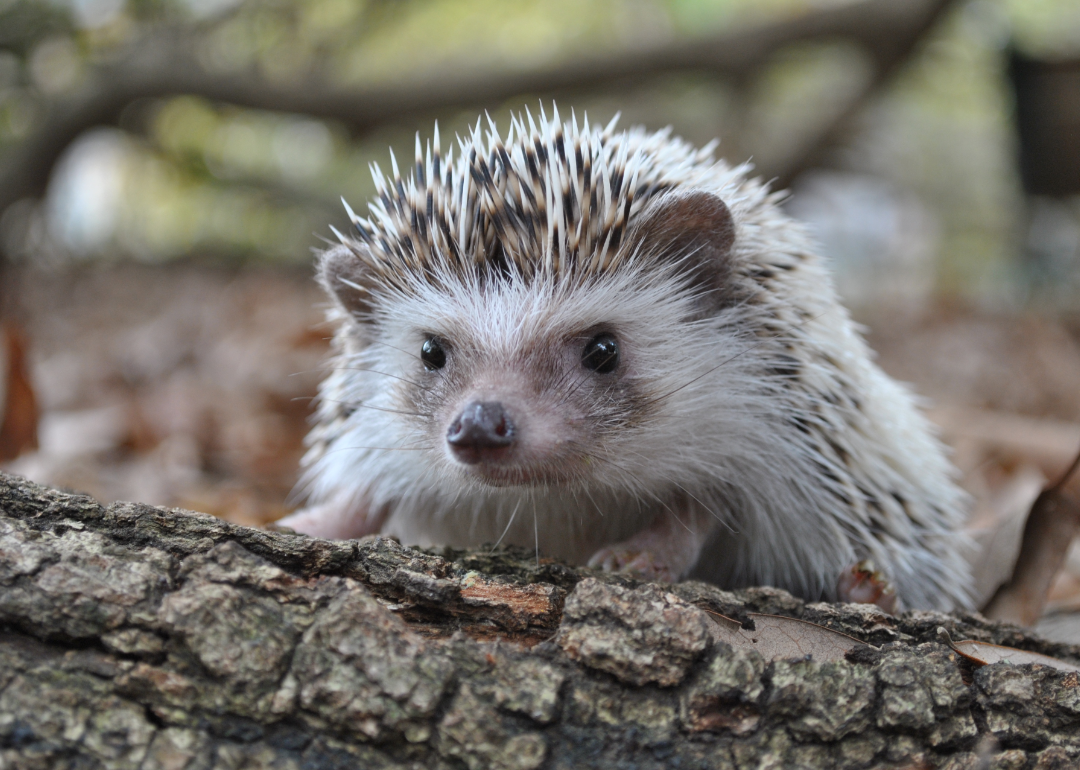
Canva
25 animals that are illegal to own as pets in the US
A small hedgehog peers over a log in the forest.
If you’ve ever dreamed of following in the footsteps of a Disney princess and having a pet squirrel or tiger as a sidekick, you might have to settle for a simple dog or cat instead.
There are many animals that are illegal to own as pets in the U.S., though few are universally outlawed. Instead, rules typically vary state by state.
The top most-banned animals tend to be large or overtly dangerous ones, like bears, big cats, or venomous snakes and spiders. However, there are many other reasons an animal could be off-limits as a pet: some animals are uniquely outlawed in cities because of the lack of space, while others carry diseases like Salmonella or Ringworm, and still, others won’t fare well in certain states’ environments.
For instance, although gerbils are usually a popular pet in most parts of the country, they are outlawed entirely in Hawaii and California, where the natural desert habitat could enable escaped gerbils to breed and become invasive. Out of fears that they will spread rabies, ferrets are barred as pets in many cities, though some states allow them so long as owners obtain a permit or rabies vaccination first.
Unfortunately, there are many stories of pet owners underestimating the ‘wild’ inherent to a wild animal. Many exotic species can never be entirely domesticated or trained, no matter how well they seem to settle in with humans. In 2009, despite having lived peacefully with a family of humans his entire life, Travis the chimpanzee unexpectedly mauled a family friend in Connecticut. This past March, an Ohio man was attacked by his pet zebra, which he had registered and owned legally.
Stacker compiled a list of 25 animals that are illegal to own as pets in the U.S. Read on to find out if your favorite animal is legal to own in your state, and what considerations it might need.
![]()
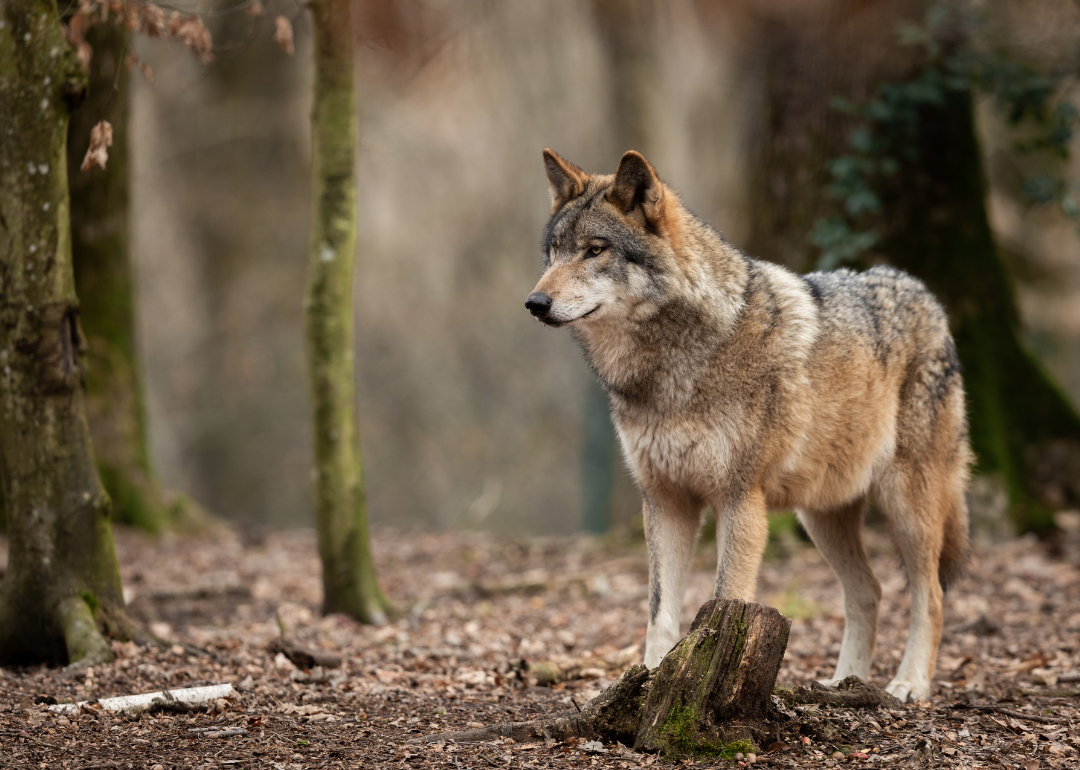
Canva
Wolves
A grey wolf in the forest.
Although many dog breeds—like German Shepherds or Siberian Huskies—pride themselves on sharing a large percentage of genes with wolves, pure wolves are illegal to own in the U.S. This is largely because it is impossible to domesticate a wolf, even if it is raised with humans from the time it is a pup. Wolves are often savvy enough to escape when in captivity, and display unpredictable and sometimes aggressive behavior.
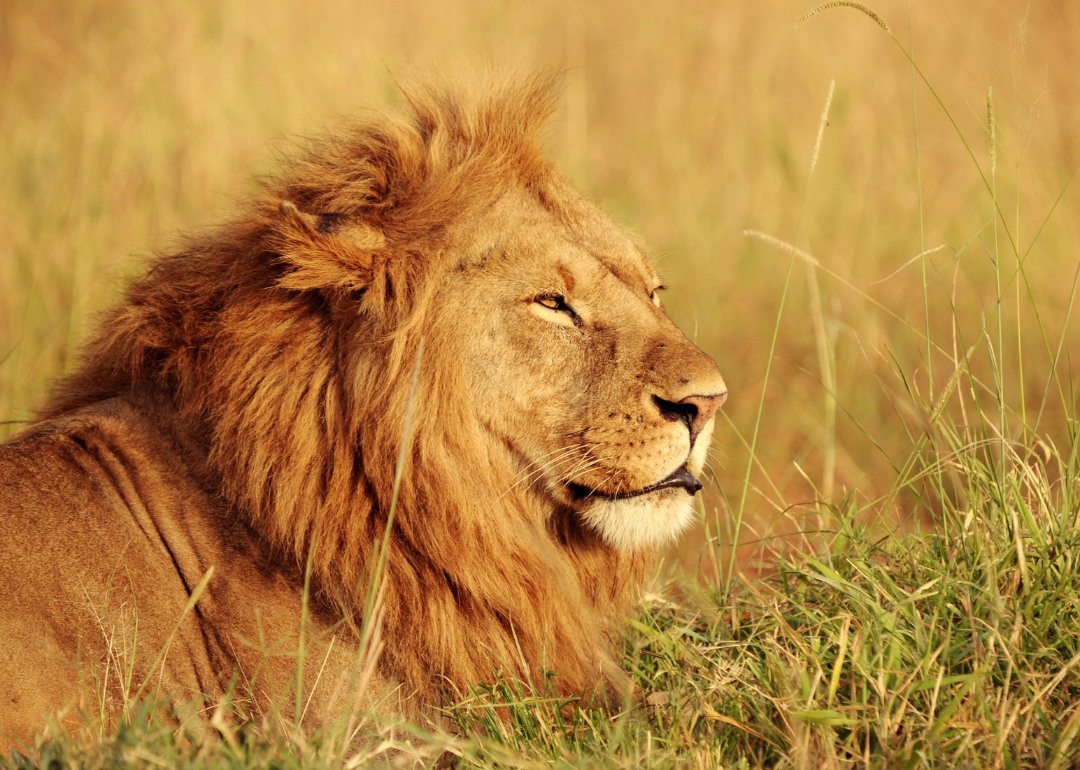
Canva
Lions
A lion in the grass.
This one is a no-brainer: lions’ natural predatory instincts, size, and strength make even the most docile individual unfit as a pet. Just last December, the Big Cat Public Safety Act was signed into law by President Biden, outlawing private ownership of lions and other big cats across the country. Those who currently own lions had 180 days to register their pets with the U.S. Fish and Wildlife Service or else face hefty fines or even jail time.
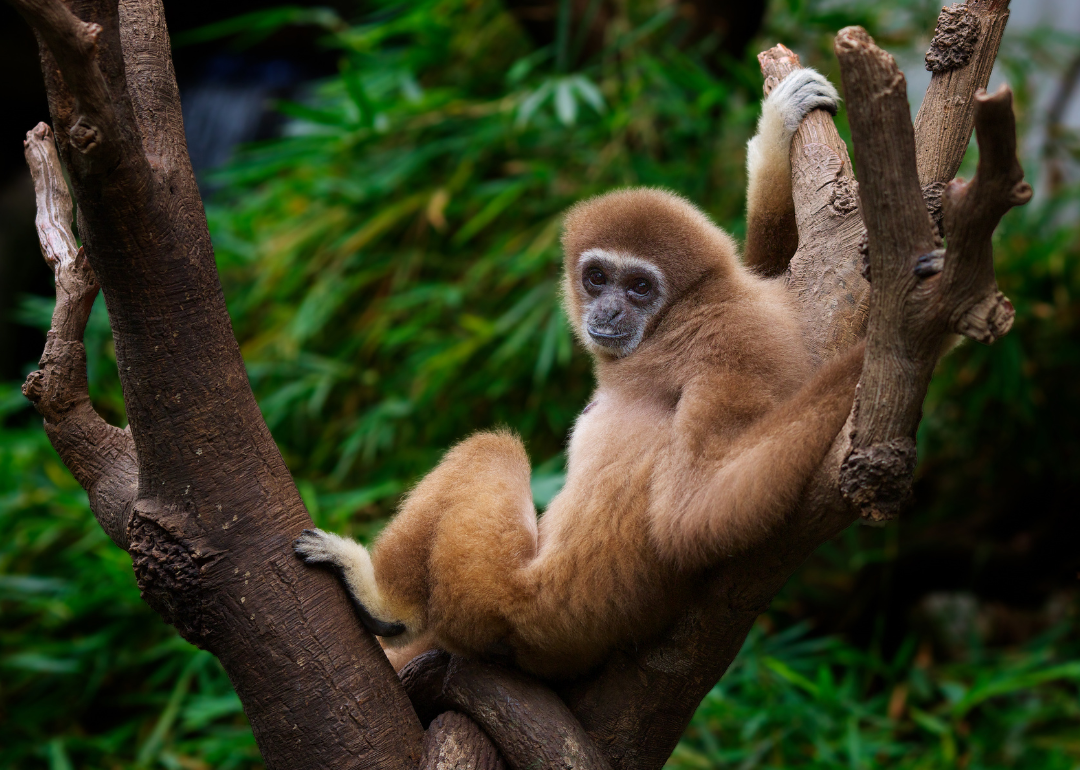
Canva
Primates
A brown monkey in a tree.
Owning a primate as a pet often depends on exactly what category it falls under—monkey or ape. There are nine breeds of monkeys that are commonly kept as pets: tarsiers, tamarins, chimpanzees, squirrel monkeys, macaques, capuchins, marmosets, spider monkeys, and guenons. However, no matter what breed, primates are usually poor candidates for pets, due to their high energy levels and demanding needs for space and social interaction. In Arizona, Mississippi, Indiana, and Tennessee, it is legal to have a monkey as a pet, but not an ape; in Wisconsin, Florida, and Texas, certain breeds of monkeys are allowed; in Illinois, only residents with disabilities may own a capuchin monkey; and in Connecticut, monkey ownership is currently being gradually grandfathered out.
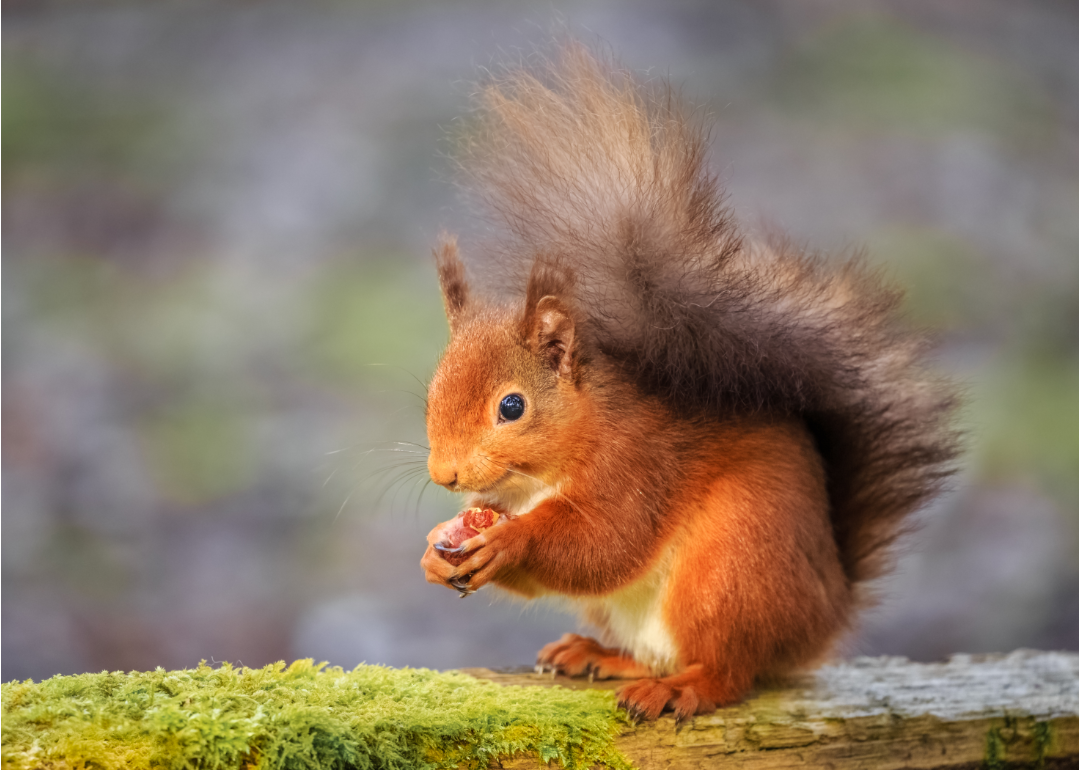
Canva
Squirrels
A red squirrel eating a nut.
They’re cute and small, but best left outside. Owning a squirrel as a pet is illegal in 26 states from coast to coast, including Alaska, New Hampshire, Alabama, and Wisconsin. Their need for ample outdoor space and sharp, furniture-destroying claws often make them destructive once put into captivity.
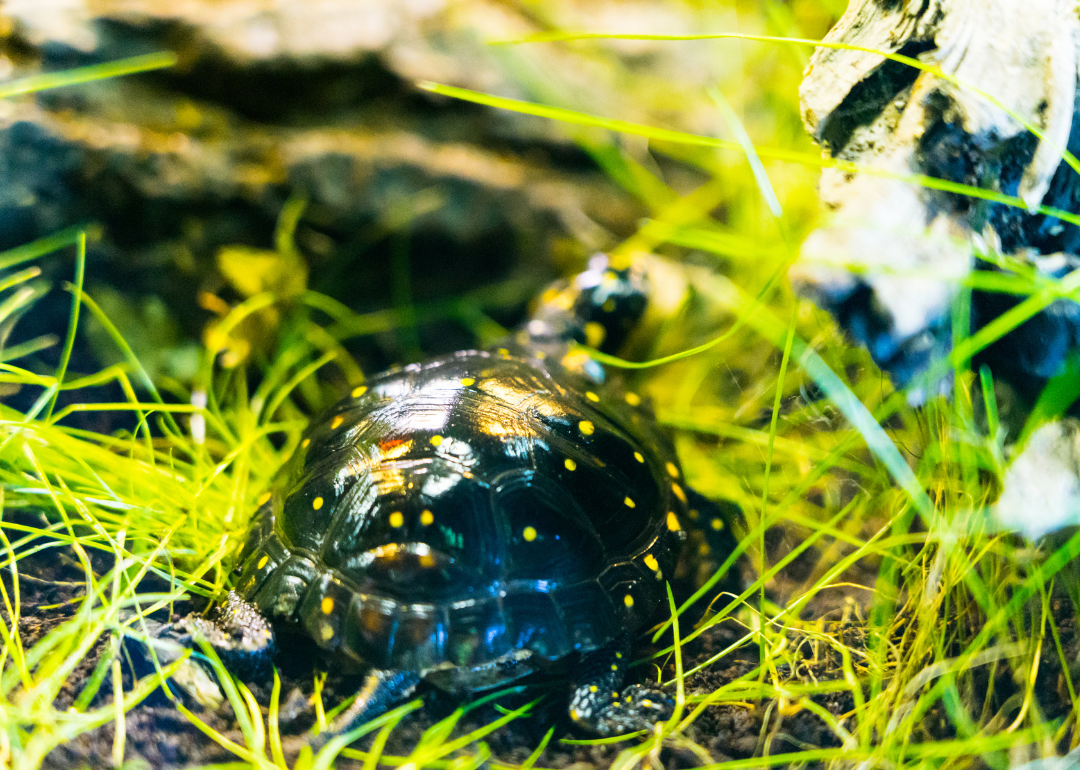
Canva
Any turtle with a shell less than four inches long
A small turtle in green grass.
In 1975, the FDA’s Public Health Services Act outlawed private ownership of turtles with shells smaller than four inches in length, including snapping turtles. Although small turtles were long popular pets, they naturally carry salmonella on their shells. This disease could be potentially life-threatening if transferred to small children.
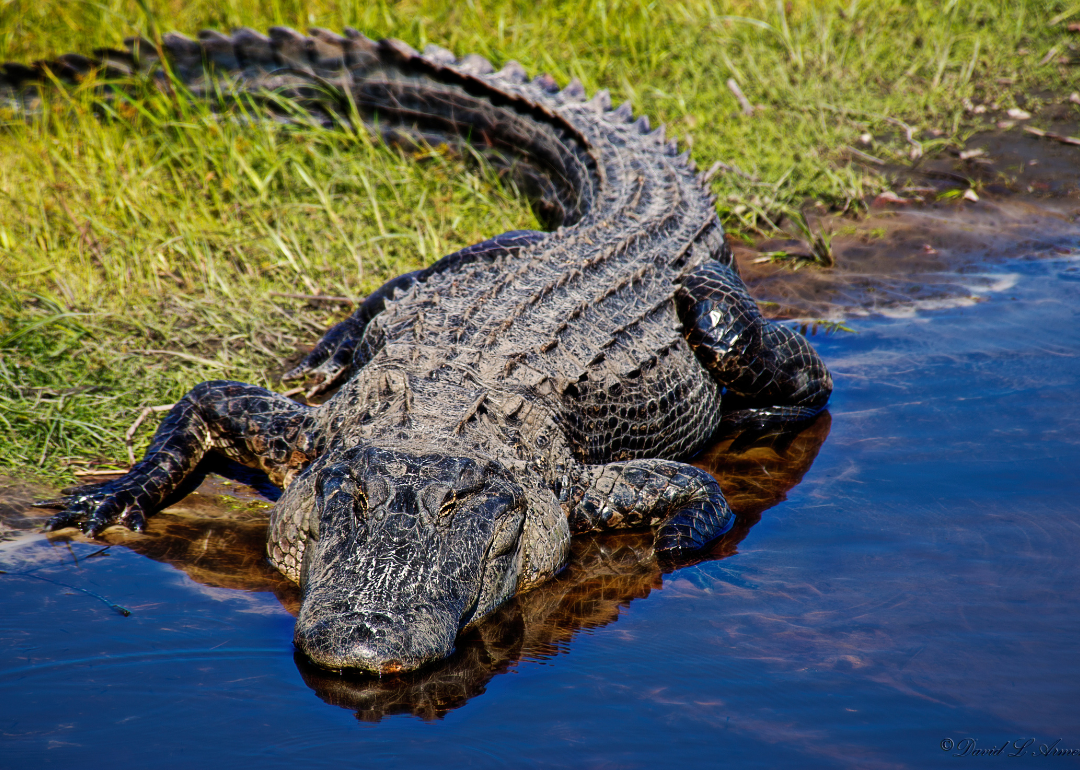
Canva
Alligators
An alligator going into the water.
In Florida, it is legal to own a pet alligator so long as you have a license; in eleven other states, it is legal with a permit; and in all other states, it is illegal no matter what. However, just because you can own an alligator privately doesn’t mean you should: fully-grown individuals can reach over eleven feet long, and are capable of inflicting severe harm. Florida is home to the most frequent human-alligator interactions in the country, with at least 24 deadly alligator attacks occurring since 1948.
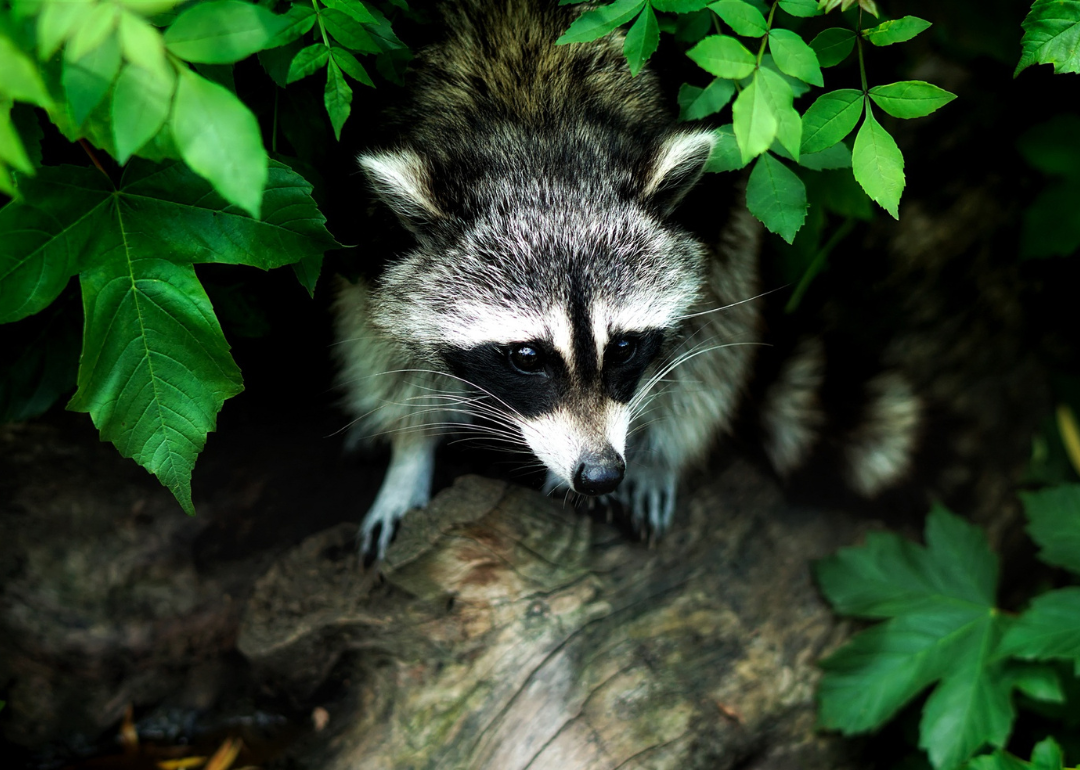
Canva
Raccoons
A raccoon on a log in the forest.
It’s not for nothing that raccoons have a reputation for being mischievous: they are known for their unpredictable behavior and ability to break into locked spaces. Even if they spend ample time with humans, they can become aggressive and attack with little warning. For this reason, it is illegal to own a pet raccoon except in Arkansas, Delaware, Florida, Indiana, Michigan, Nebraska, Oklahoma, Pennsylvania, Rhode Island, South Carolina, Texas, Wisconsin, and Wyoming.
*
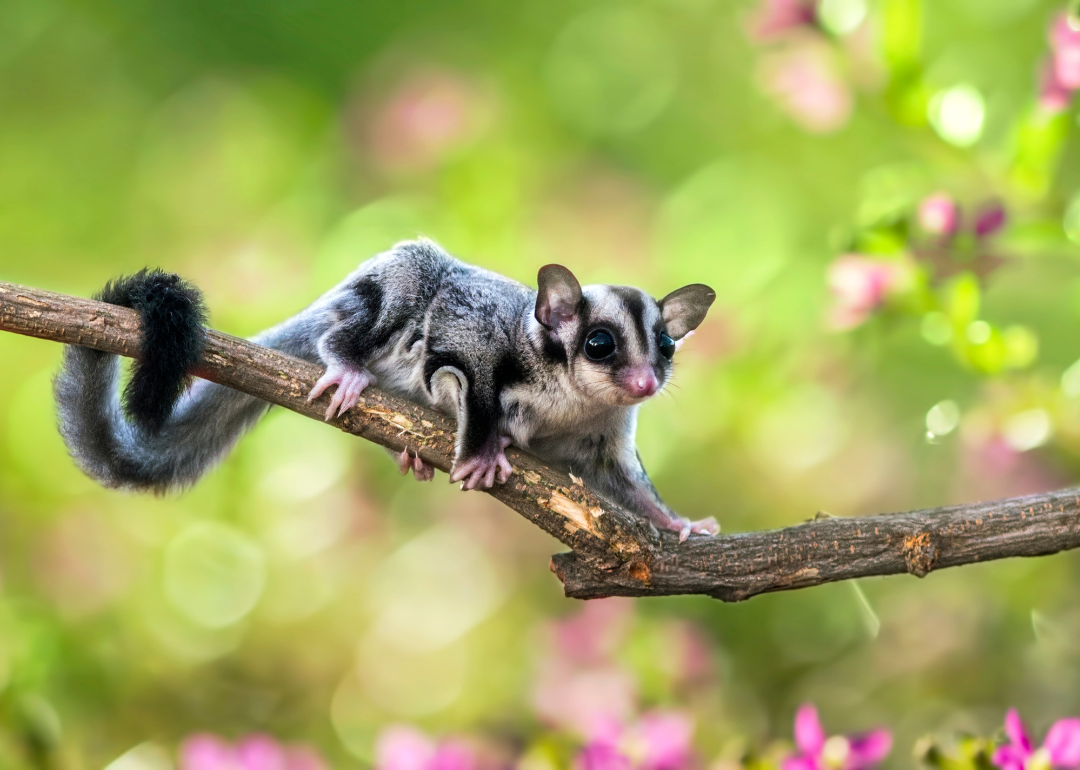
Canva
Sugar gliders
A sugar glider on a branch with pink flowers in the background.
Sugar gliders, a tiny cousin of the kangaroo, have become popular exotic pets due to their cute faces and playful ability to glide across surfaces. However, they are illegal to own in Alaska, Hawaii, California, Massachusett, New Mexico, and some cities like New York City. Their need for large spaces to live in, and other marsupials to interact with, means that many sugar gliders will become depressed if kept in private residences.
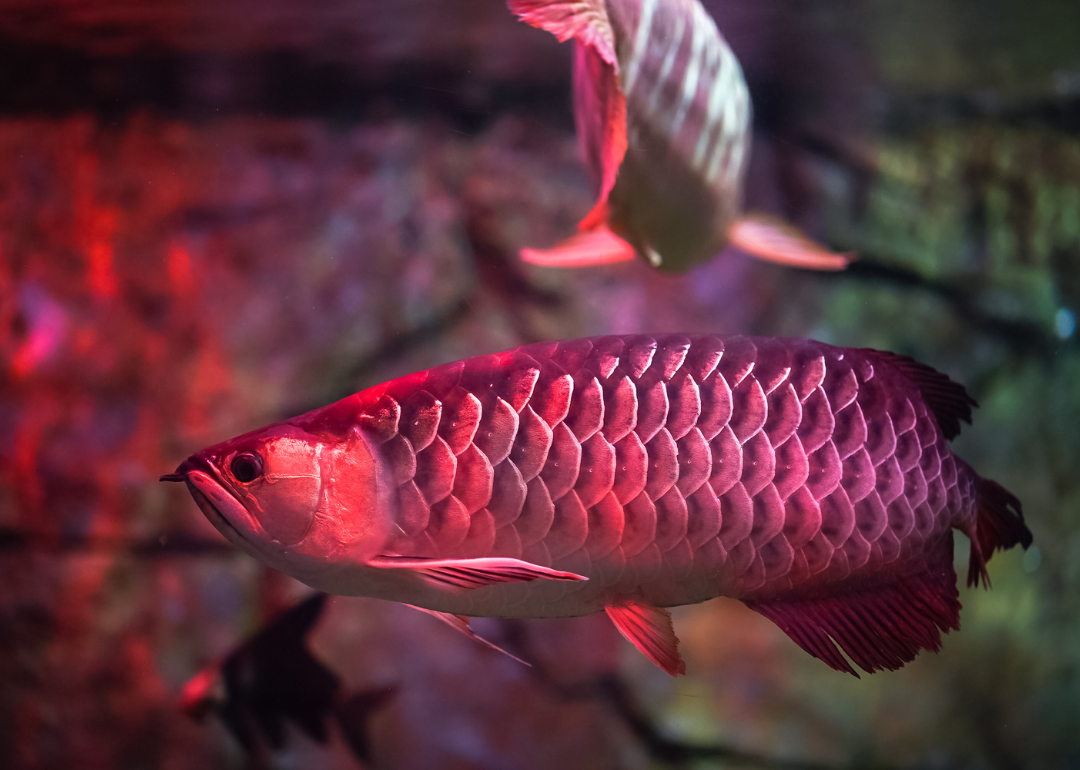
Canva
Asian arowana
A red Asian Arowana fish.
This exceedingly rare three-foot-long fish can cost over $150,000 when purchased abroad. This is partially due to its cultural significance in Asia as an emblem of good luck. However, it is illegal to own an Asian arowana in the U.S., due to its status as critically endangered.
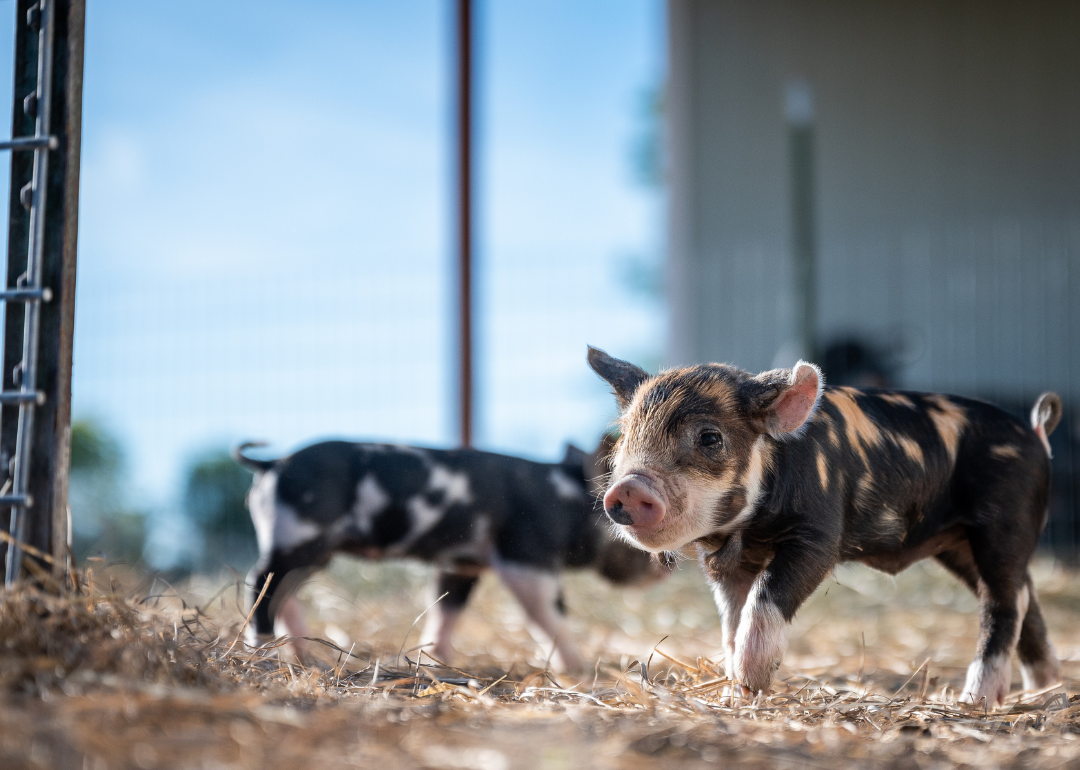
Canva
Pigs
Small brown and black spotted pigs.
Mini pigs are increasingly popular as house pets—but the problem is, there isn’t actually such a thing as a “mini” pig. Even “teacup” and “micro” pigs are actually just underfed piglets that will eventually grow to over 100 pounds, with some even exceeding 500 pounds. Additionally, many adults can become aggressive toward humans. Many cities, including New York City, outlaw keeping farm animals within city borders, which many pig owners don’t realize until it’s too late.
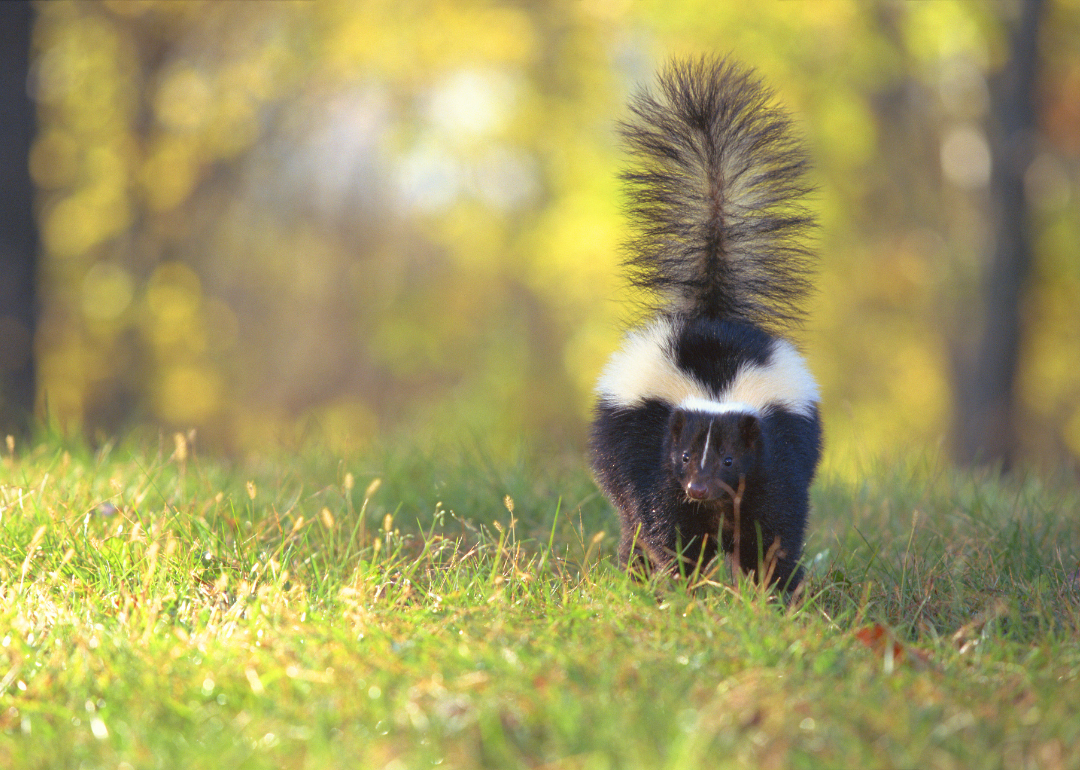
Canva
Skunks
A skunk walking in the grass.
The first thing someone hoping to keep a skunk as a pet should do is descent it, which refers to having its scent glands removed so it can’t spray its odor around the house. However, even if descented, it is still illegal to own a pet skunk outside of 17 states. Besides their famous smell, skunks’ unusual diet needs and penchant for destruction make them ill-fitted for domestic life.
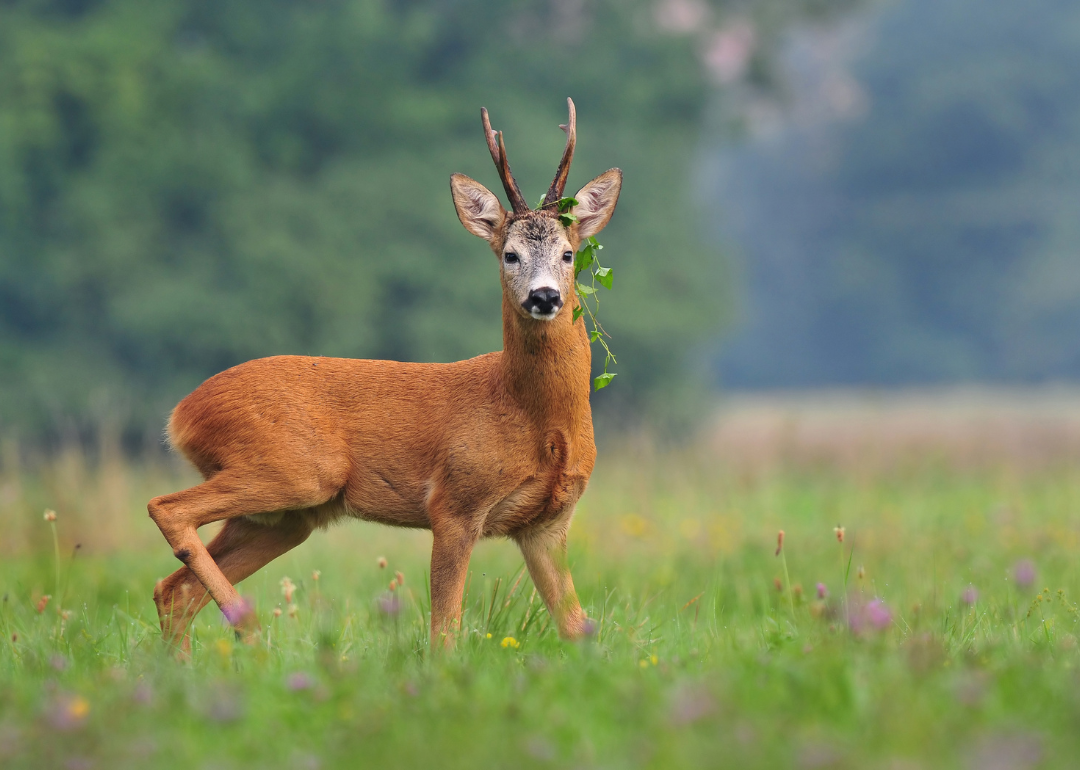
Canva
Deer
A deer in a field of flowers.
No matter if it is a red deer, white-tailed deer, or some other species, most deer are illegal to own as pets across the U.S. Notable exceptions include Colorado, New Hampshire, Vermont, and South Dakota, but ownership is usually subject to permits and regulations. Besides their size, deer are often territorial and moody, making them dangerous if kept in close confines with humans.
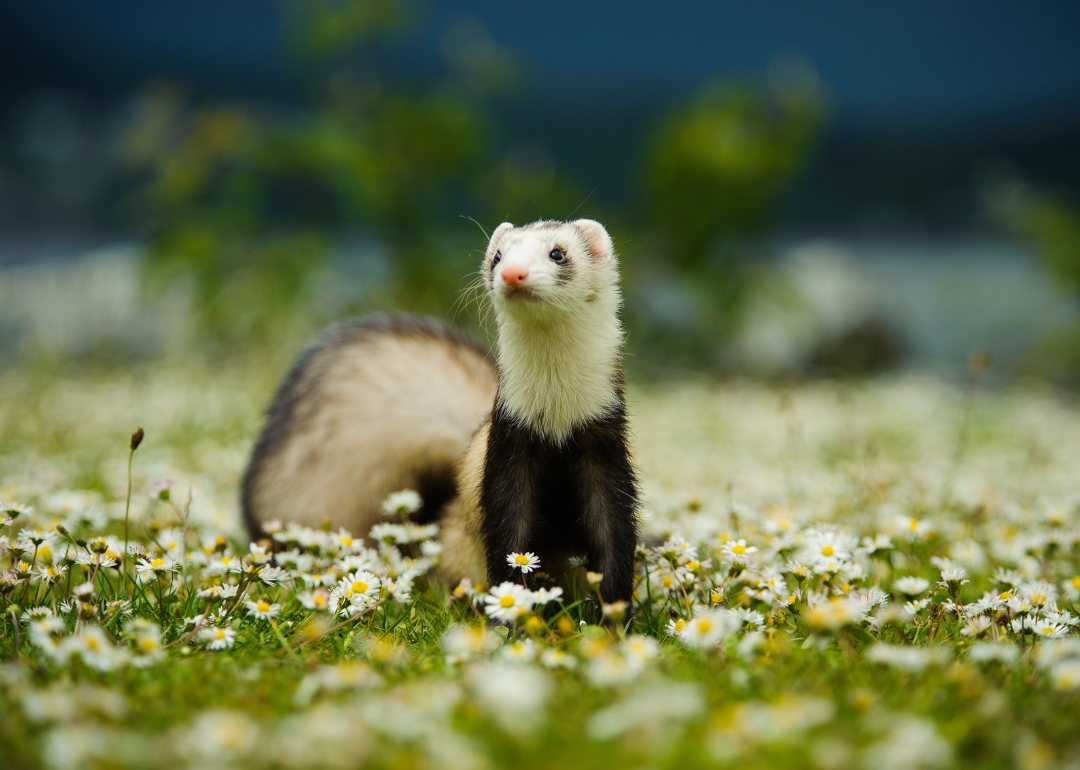
Canva
Ferrets
A ferret in a field of flowers.
It might be surprising to know that ferrets aren’t universally allowed as pets, considering their popularity in pet stores. However, they are banned in California and Hawaii. Both states fear the spread of rabies, especially Hawaii, which wants to preserve its status as the only state that is completely rabies-free at the moment.
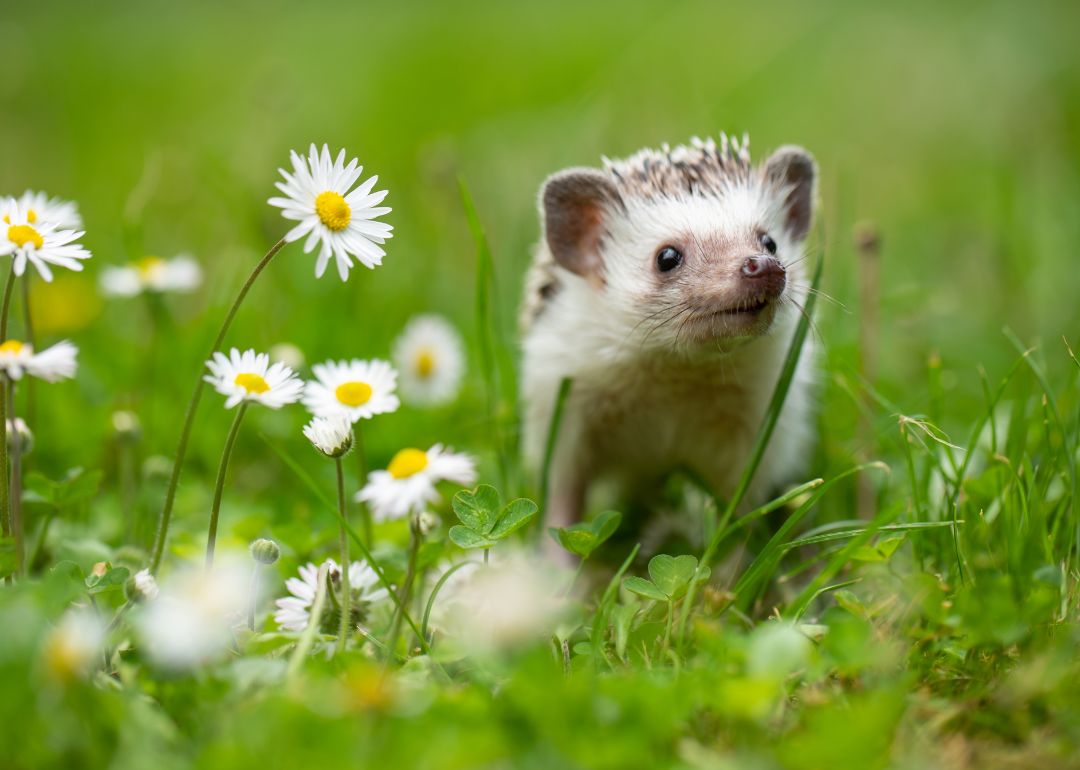
Canva
Hedgehogs
An african pygmy hedgehog.
African pygmy hedgehogs in particular are increasingly popular as pets but are illegal to privately own in California, Hawaii, Georgia, Washington D.C., New York City, and Omaha. Despite their small size and cute demeanor, their defensive quills can harm owners, and they often carry zoonotic diseases like salmonella and ringworm. Additionally, hedgehogs don’t actually enjoy interacting with humans: they often feel anxious or threatened when being handled.
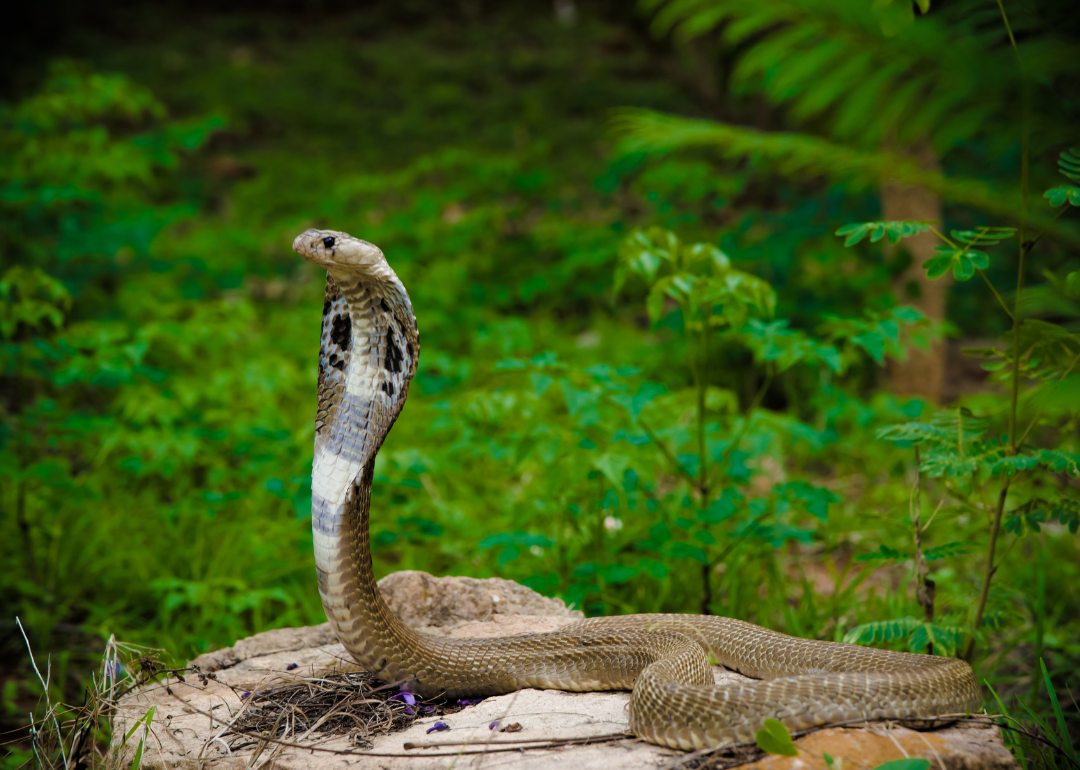
Canva
Venomous snakes
A cobra on a rock with a forest in the background.
Even if you remove their venom, it is illegal to own venomous snake species in Tennessee, Vermont, Delaware, Georgia, Illinois, New Hampshire, Washington, Florida, Indiana, Iowa, Missouri, Kansas, Louisiana, Maryland, New Jersey, New York, Washington D.C, California, and Connecticut. This past January, officials in Georgia and Florida uncovered nearly 200 banned species of snake being sold under the table. For many of these—including various types of cobras and vipers—no anti-venom is available in case an owner is bitten.
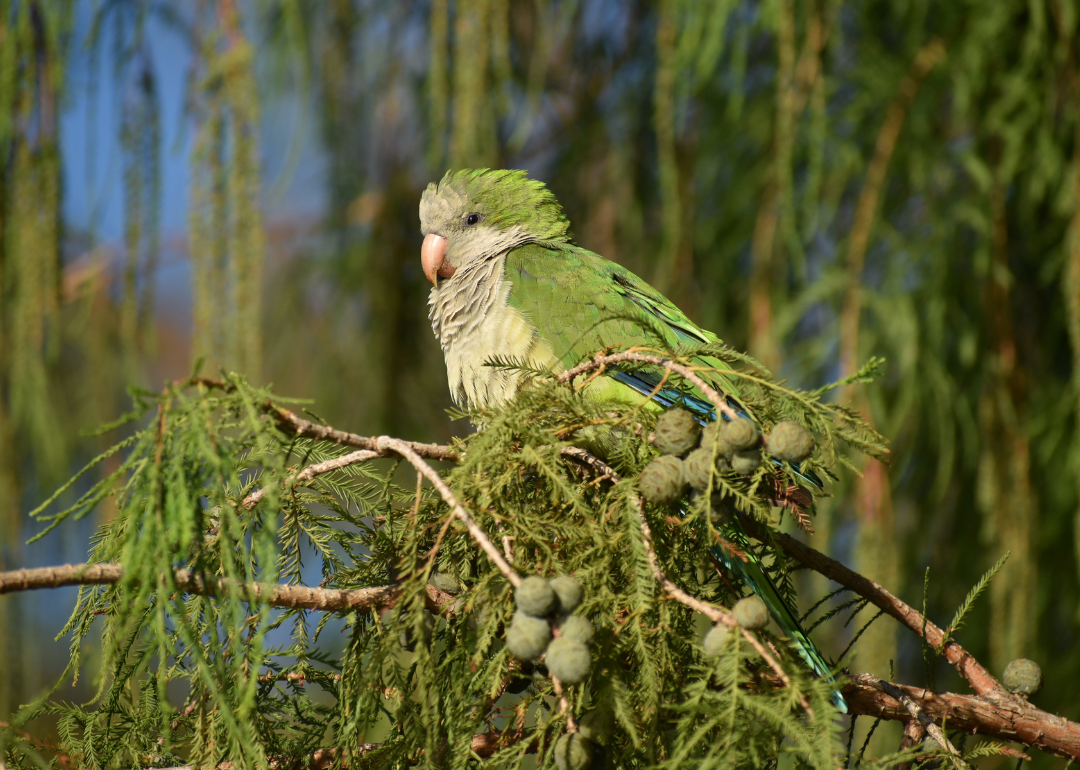
Canva
Quaker parakeets
A green quaker parakeet on a tree branch.
It is currently illegal to own a Quaker parakeet in California, Connecticut, Colorado, Georgia, Hawaii, Kentucky, Pennsylvania, Rhode Island, Tennessee, and Wyoming. In some states, including Ohio, New York, Virginia, Vermont, Maine, and New Jersey, it is possible to own one, so long as you obtain a permit and micro-chip your bird. The reason for these strict regulations is that these formerly-popular household pets have been known to escape and form colonies of their own in the wild, causing damage to local agriculture.
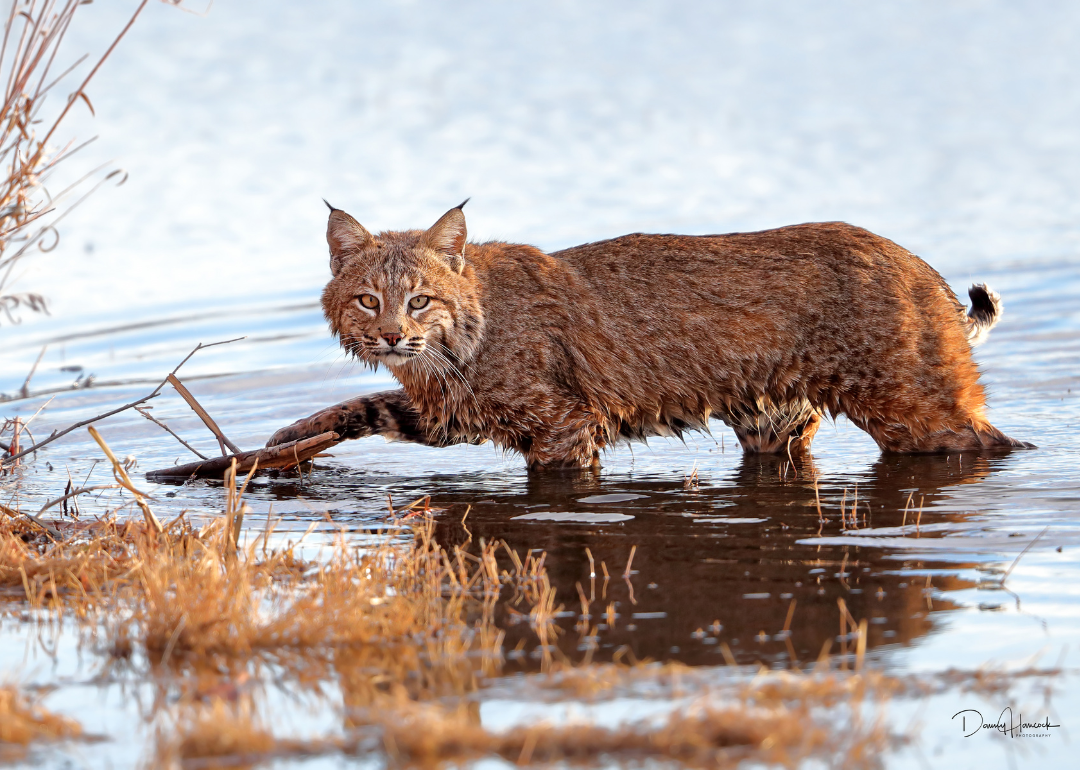
Canva
Bobcats
A bobcat walking through water.
If you are not a resident of Alabama, Nevada, North Carolina, South Carolina, or Wisconsin, you will have trouble getting permission to privately own a bobcat. In some other states, permits are available, but in many, bobcats’ large size and naturally predatory instincts outlaw them as pets in any circumstance. Ownership sometimes depends on the number, however: in Arkansas, for instance, you are allowed to own up to six bobcats.
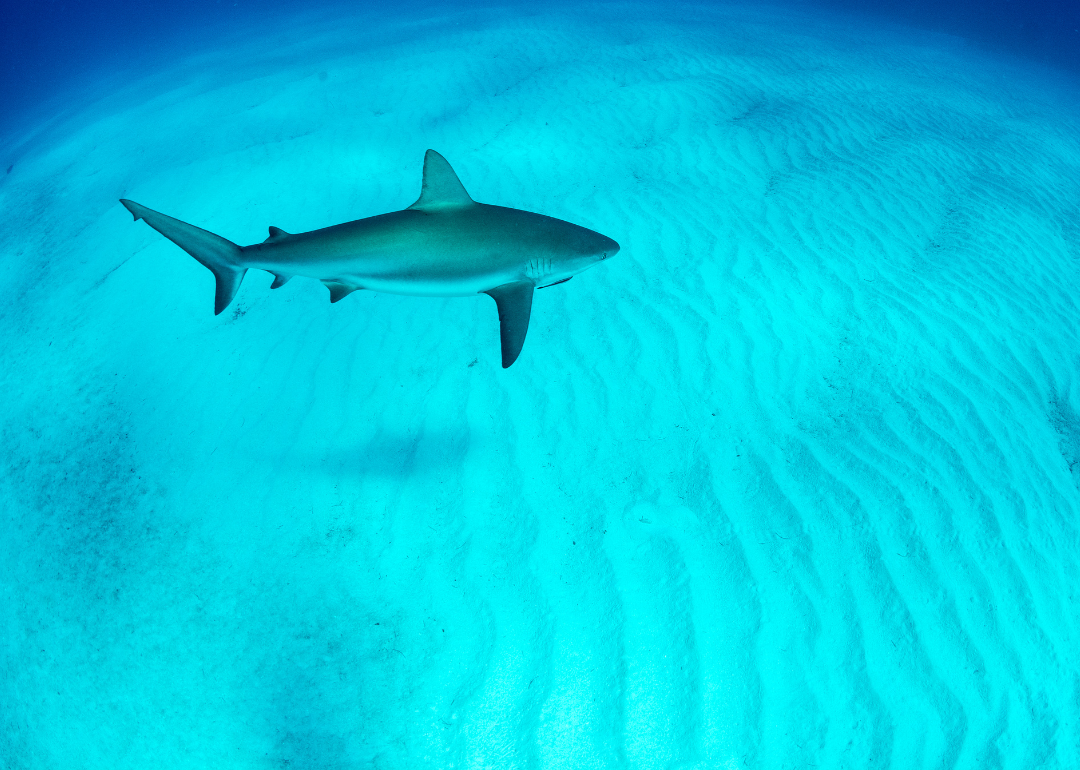
Canva
Sharks
A shark in turquoise water.
Some small shark species, including leopard sharks, catsharks, horn sharks, and zebra sharks, have been known to be kept in large aquariums as pets, but for the most part, owning any larger species is outlawed. A recent boom among the California elite in private shark ownership has caused many states to reexamine their laws regarding the individuals keeping these large creatures inside their homes. Freshwater sharks are subject to most state bans.
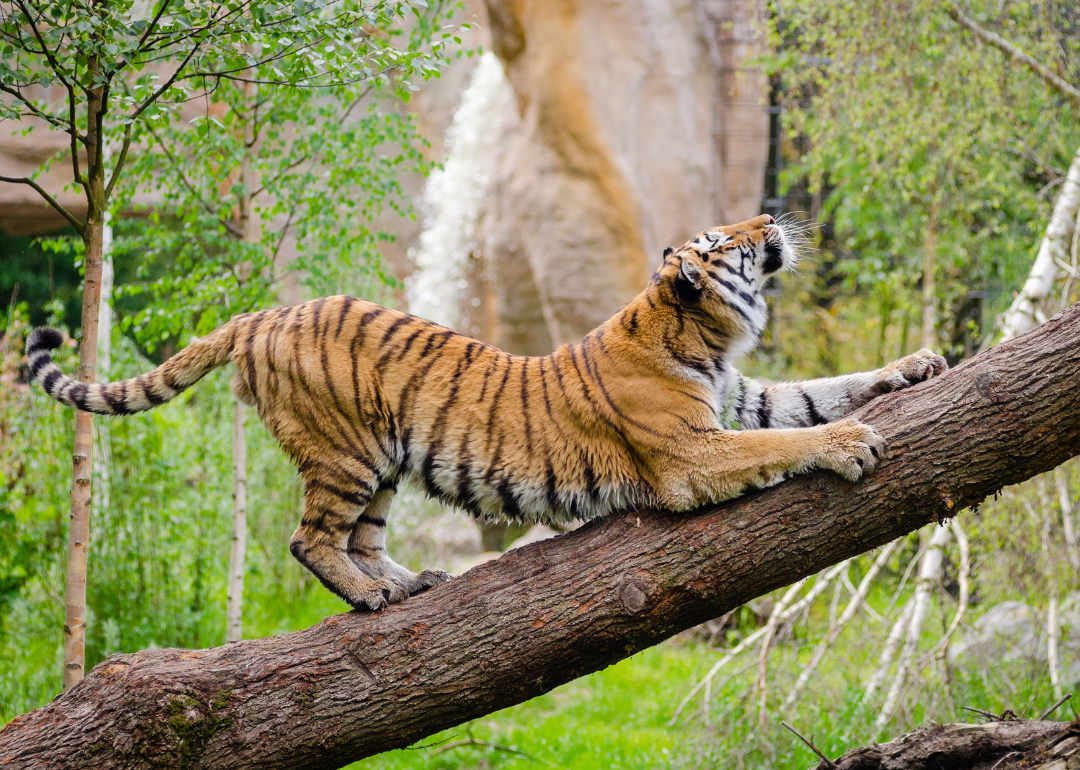
Canva
Tigers
A tiger stretching on a tree branch.
More tigers are privately owned in the U.S. than exist in the wild: as of 2019, there were around 5,000 tigers being legally kept captive across the country, as compared to only 3,890 roaming their natural habitat. This will likely soon change, as last December’s Big Cat Public Safety Act outlawed keeping big cats as pets. Many owners underestimate the demands of owning an adult tiger, which requires 15 pounds of meat daily and at least seven square miles of space, or else they will become dangerously aggressive.
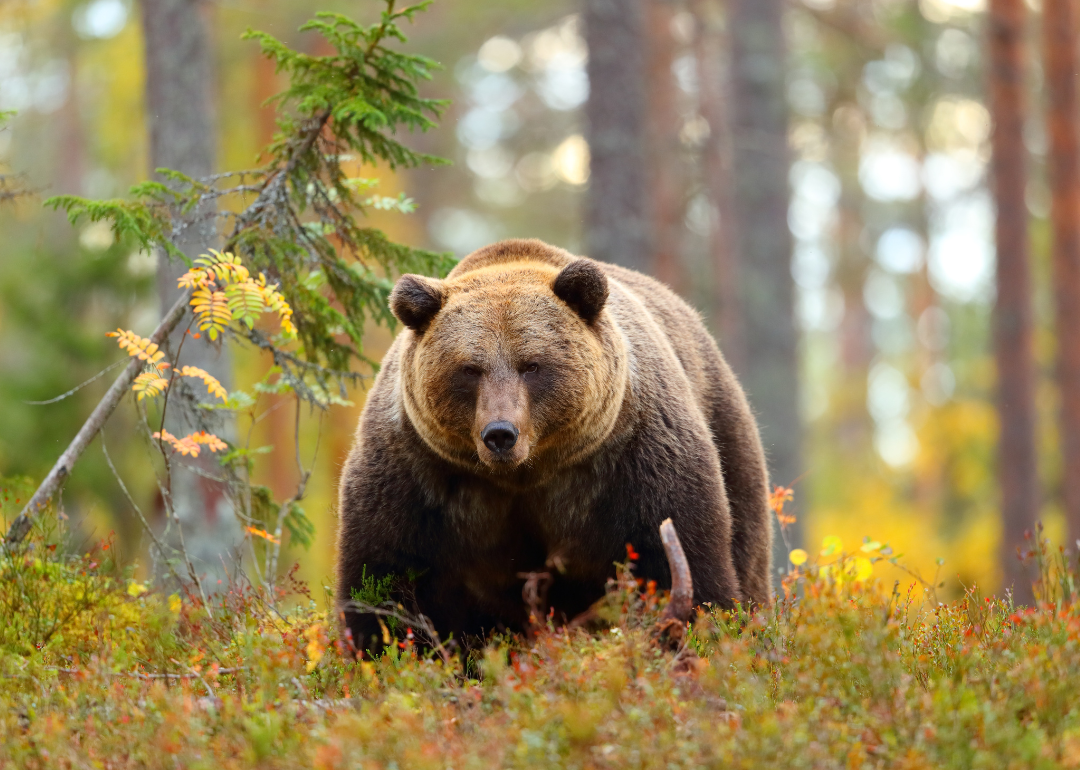
Canva
Bears
A brown bear in a forest.
Most states have a blanket ban on “bears,” but in some states, only specific types are outlawed. Black bears are illegal to own in Alabama, Missouri, Oklahoma, Rhode Island, and Tennessee. Black and grizzly bears are illegal in Wyoming. And unluckily for the adventurous Arctic explorer, black, grizzly, and polar bears are all banned as pets in Louisiana.
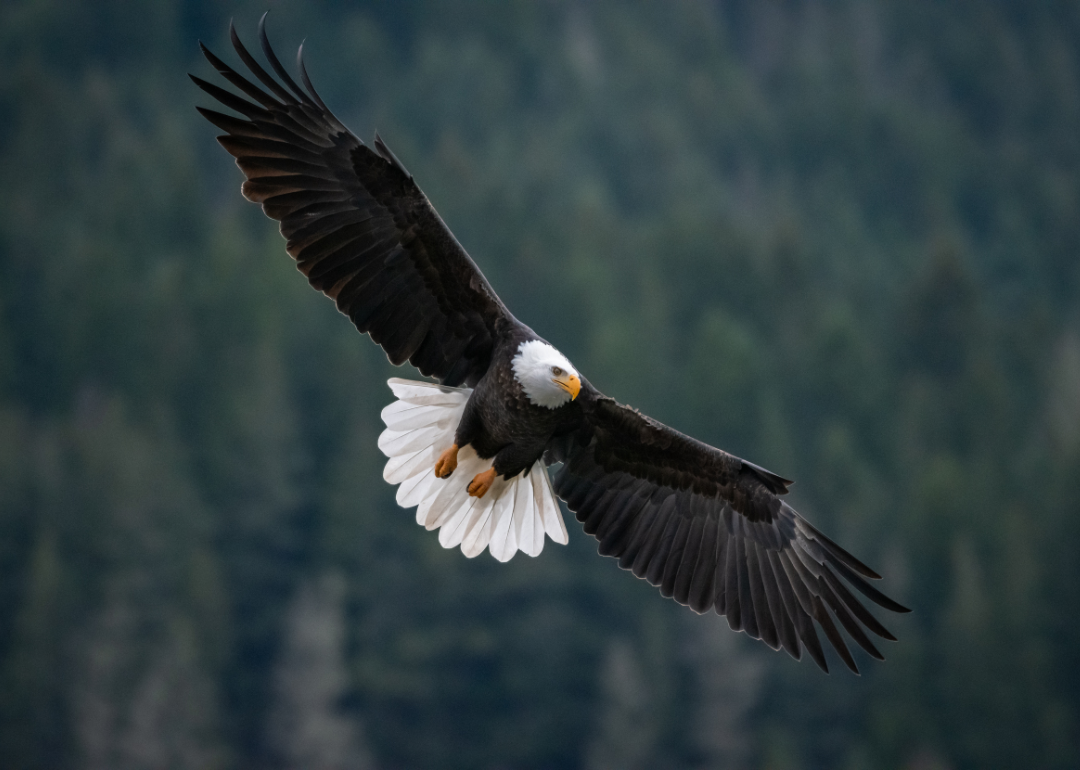
Canva
Eagles
An eagle flying.
Not only is it illegal to own an eagle as a pet, but it is also illegal to hunt them or to own their feathers, eggs, or nests. This is thanks to the Bald and Golden Eagle Protection Act, which Congress passed in 1940. Owning a bald eagle may be more relevant in some states than others—like Alaska, where a whopping 30,000 bald eagles are estimated to live in the wild.
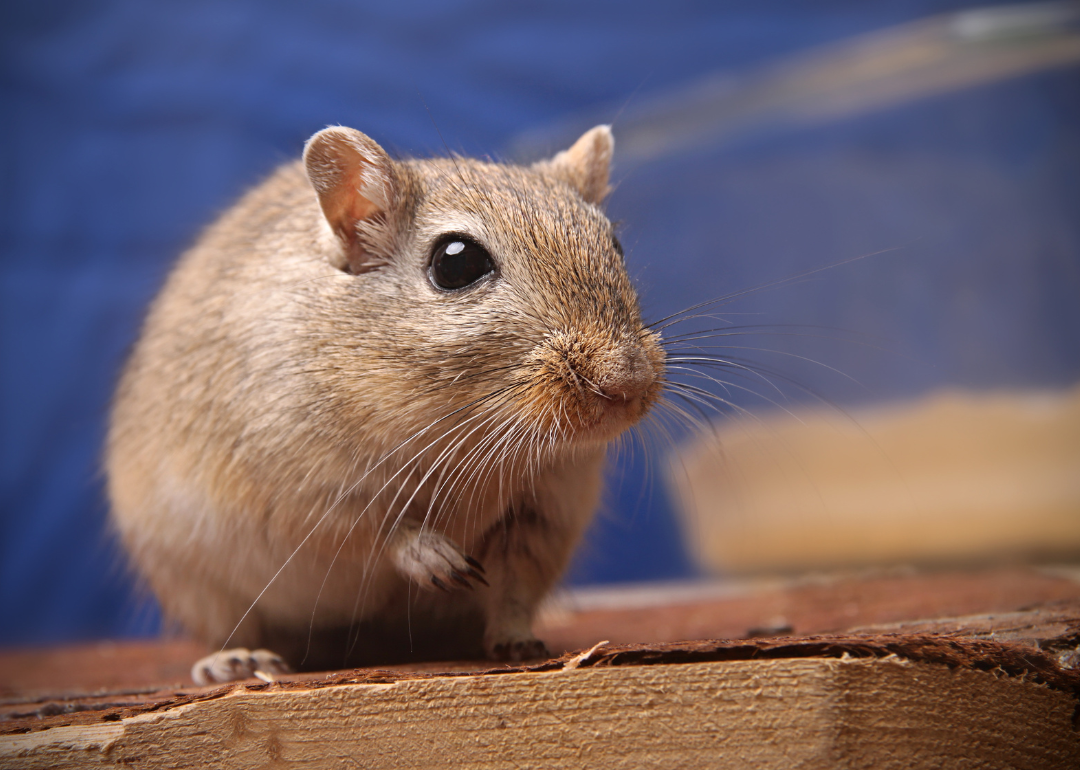
Canva
Gerbils
A gerbil sitting on a piece of wood.
In most states, a gerbil is a common pet. But in California and Hawaii, it is an illegal possession subject to fines. This is because both states contain landscapes similar to that of the gerbil’s natural habitat. This could potentially allow gerbil colonies to form and thrive in the wild, invading other native plants and animals.
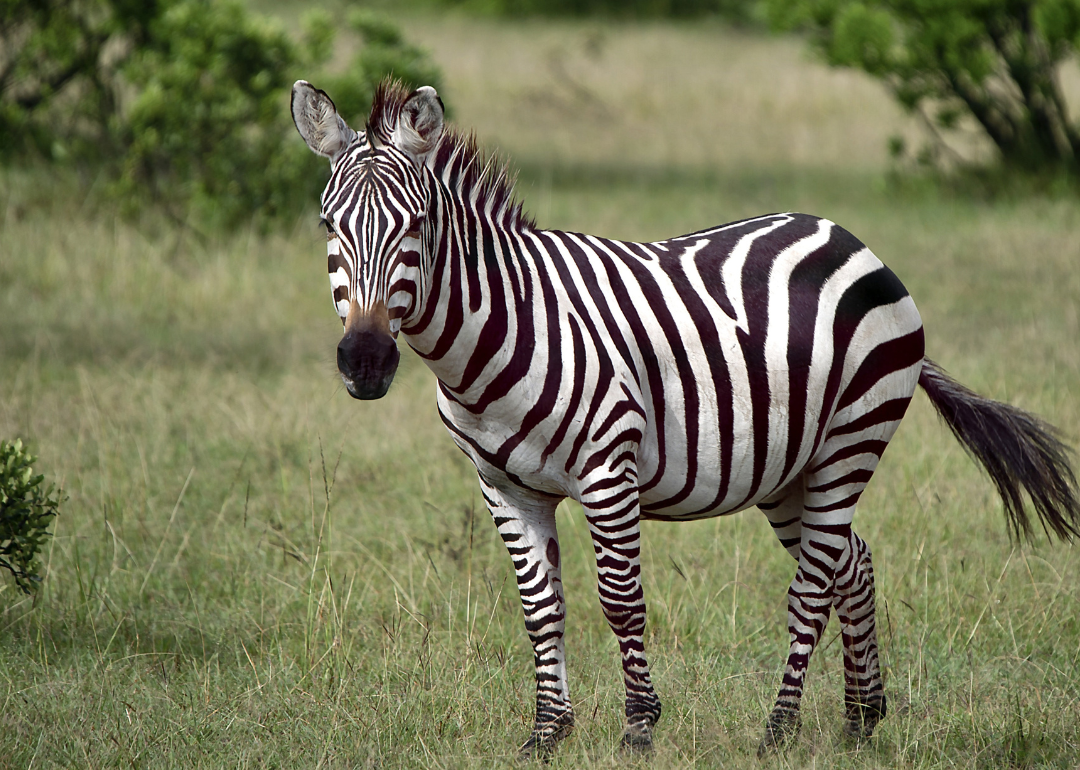
Canva
Zebras
A zebra standing in the grass.
Surprisingly, owning a zebra is actually legal in most states, but outlawed in Nevada and New Hampshire, as well as Washington D.C. Although it is sometimes legal, however, owning a zebra is extremely ill-advised: the species is impossible to domesticate and can be volatile and aggressive around humans. One Ohio man learned this the hard way when his adult male zebra attacked him, nearly severing his arm.
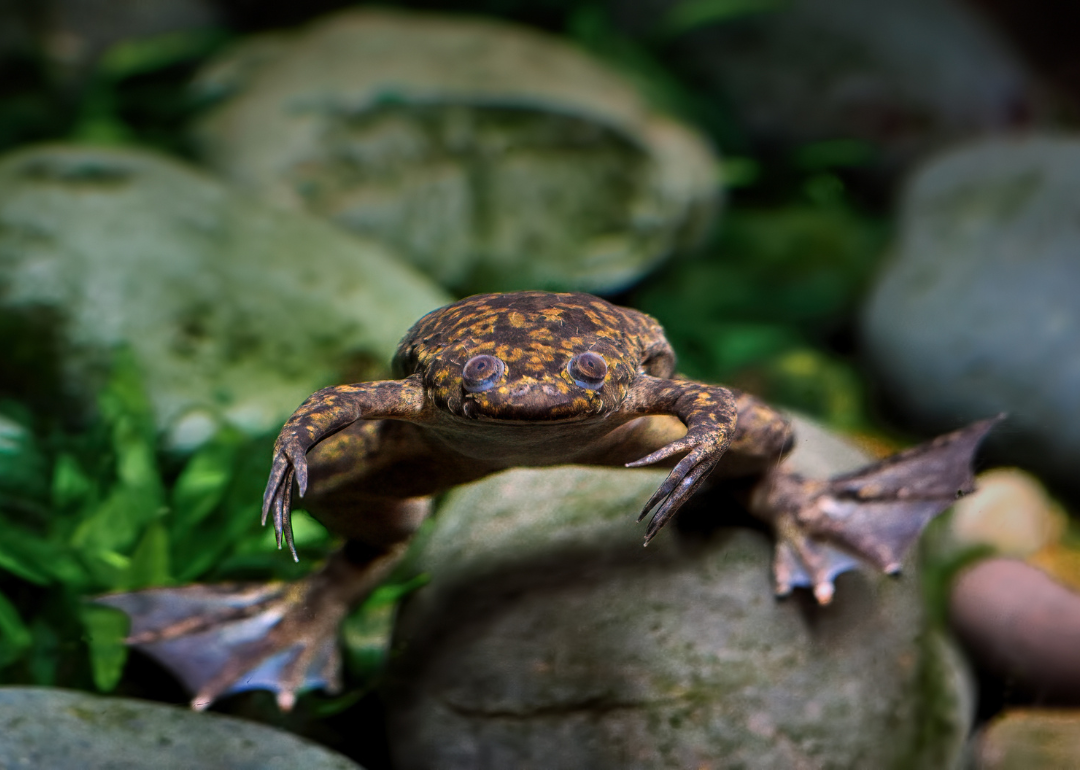
Canva
African clawed frog
An African clawed frog in the water.
In Arizona, California, Hawaii, Kentucky, Louisiana, Nevada, New Jersey, North Carolina, Oregon, Virginia, or Washington, it is illegal to own an African clawed frog without a permit. That’s because this species carries a fungus that has historically decimated other frog populations, and has even been known to eat other fish and tadpoles. They are also able to reproduce rapidly, which can lead to them taking over a native species’ habitat and ousting them.
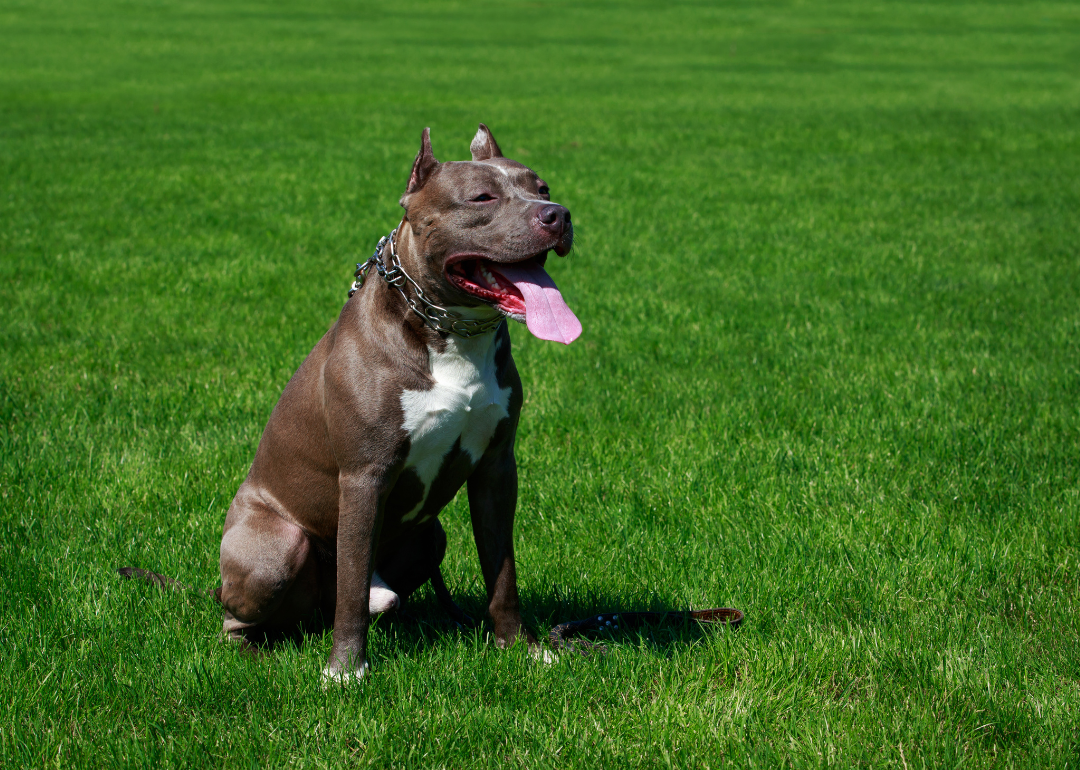
Canva
Pit bulls
An American pit bull sitting in the grass.
Over 700 cities across the country have outlawed pit bull ownership, which can include breeds like the Staffordshire Bull Terrier, American Pit Bull Terrier, and Miniature Bull Terrier. Over half of all fatal dog-on-human attacks are the result of pit bull types, sparking the restrictions. In some cities, pit bulls are only allowed as pets so long as owners buy liability insurance, muzzle the dogs in public, or keep them behind sufficiently tall fences.
Data reporting by Kelly Glass. Story editing by Not Needed. Copy editing by Robert Wickwire. Photo selection by Lacy Kerrick.